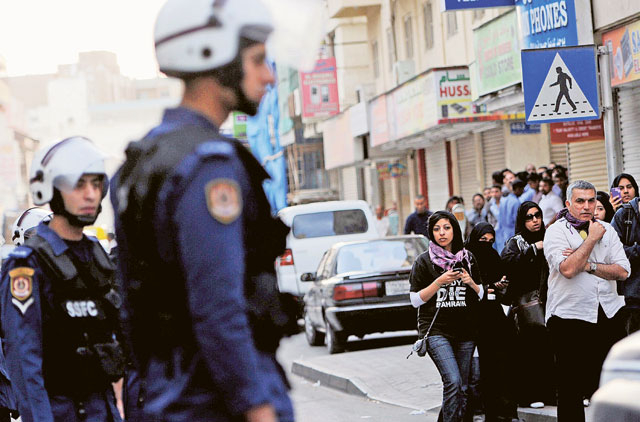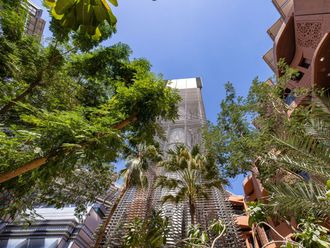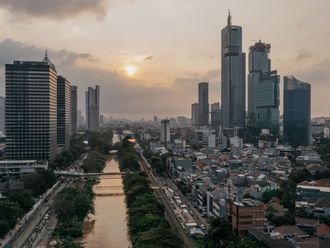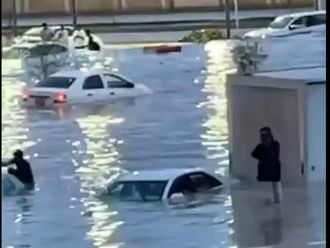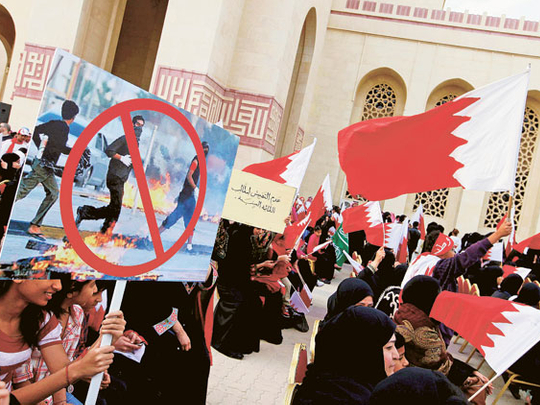
Manama: Muhannad looked upset as he leaned back on the large sofa to sip his green tea. He has been trying to explain that as a Sunni married to a Shiite, he wanted to live like everybody else, away from clichés that have been plaguing him and his wife Hala since Bahrain's society has been fractured alongside sectarian faults by the earthquakes that rocked it in February and March and well beyond.
"We feel troubled by what is happening. We have been through a lot, but now that February 14 is almost here, everybody wants to know how my wife and I as well as our families have been faring for the last 12 months," said Muhannad, the head of a government department.
"For Hala and me, February 14 is when we celebrate the day we met five years ago at a mutual friend's party. It is a celebration of love," he paused to finish his tea. "I know for some Bahrainis, February 14 is the celebration of the National Action Charter, the document that launched political and constitutional reforms. For others, it is the launch of large demonstrations to ask for more freedoms and rights. Regretfully, a miscalculated dimension was forced onto the movement at a later stage, resulting in deaths, confrontations and social divisions mainly between Sunnis and Shiites."
His wife lost her job in March and after nine months of moral and material difficulties, she was reinstated. Scars did not fade, but he says they are keeping a brave face.
"We try not to hold grudges against anyone. We in my nuclear family wish to look together in the same direction and beyond all the events because we resent the feeling of disrupted lives," Muhannad said.
The feeling that many Bahrainis have of leading shattered lives in a turbulent region explains the hopelessness and unpleasant aspects of their daily routines. Many now believe that there can be no bright tomorrow if the various segments of the society do not come together and agree on working together, without exclusion and with shared hopes.
"I could not take it anymore and decided to leave Bahrain, at least for some time," Mohammad, a media specialist, with strong friendships among Sunnis and Shiites. "I needed the break in order to be able to breathe," he said.
Many others with "beautiful dreams" about Bahrain stayed on, to continue the struggle against those pushing their agendas.
"I have had my most challenging experiences in Bahrain," Cherif Bassiouni, the chair of the Bahrain Independent Commission of Inquiry (BICI), a UN modeled fact-finding team of international law experts who looked what happened in Bahrain and determined responsibilities, told Gulf News in November, one day after presenting his searing fact-finding report.
The legal expert had worked in former Yugoslavia, Afghanistan and Libya. Yet, he remained confident a solution between Sunnis and Shiites could be reached.
"My one wish for these two groups would be to share the belief that this is their country, that they can share in their country — they can have other identities so long as the sense of fundamental linkage is there," he said.
"Right now I think a Shiite feels estranged in their own country. And I think Sunni feels threatened in their own country. The country is going to need to address the sense of threat and estrangement," he said.
The panorama and sea view from the hotel room window behind him was breathtaking while insouciant birds flitted between trees, clinging to the branches.
However, the cheerful scene was strikingly distant from the mood prevailing in Bahrain. One year ago, a succession of traumatic events conspired to take Bahrain to where it stands now.
On February 14, several societies, building on the events in Tunisia and Egypt, launched a movement to demand reforms and better living conditions.
The calls were initially supported by several Sunnis who have been pushing for a faster pace of change, more rights and better living standard enhancing projects.
The protests however took in a new significance after two demonstrators were killed by the police on the first and second day and the protests, initially located in villages, moved to the Gulf Cooperation Council (GCC) Roundabout, popularly known as the Pearl Roundabout, near the central market.
Protestors set up tents and turned the area into the epicenter of their movement. The authorities, unaccustomed with such public action, tried to clear the roundabout, but more people were killed and injured, including policemen, in the confrontations.
Crown Prince Salman Bin Hamad Al Khalifa stepped in and addressed the nation on television, seeking to defuse the ominous tension by calling for calm, the holding of a dialogue "where no-one would be excluded and no subject be off the table" and by ensuring that the military units stationed in the area regained their barracks.
"We do not have sects, we have Bahraini Muslims," Prince Salman said. "We do not categorise people as Sunnis or Shiites. However, Bahrain is a divided nation and this is an escalation that we do not want. Today we are at a crossroad … Today is the time to sit and talk," he said on February 18.
However, his offer, although unprecedented and with a wide range of promises, was not taken up by the opposition societies that that they would not join in talks unless their conditions were met. Their stance stalled the dialogue and prompted the US to send in Jeffrey Feltman, US Assistant Secretary of State for Near East Affairs, to help them appreciate the opportunity.
"There is a need for all parties to work immediately to begin a dialogue that answers the legitimate aspirations of the Bahraini people," Feltman said.
However, he said that dialogues required compromises. "Negotiations lead to certain results. We cannot start with results," he said.
"The message is to encourage dialogue and not allow extremists to set the agenda. All sides have extremists and they must not impose the agenda," he said.
Professor Bassiouni later said in his report that the opposition had missed a "golden opportunity."
Tension deepened, particularly after a radical group in March called at the Roundabout for a change of the political regime and the declaration of an Islamic republic.
The call alarmed Sunnis who felt that the demands have turned sectarian and that they would be the first victims of a new political regime, modeled after the one in Tehran.
They set up the National Unity Rally and held mass rallies during which their new leader Abdul Lateef Al Mahmood said that as the emerging force in the country, they had the right to be included and involved in any talks or negotiations.
However, radical protestors decided to escalate the situation and, despite calls from political societies to appease the situation, they shifted their demonstrations and sit-ins to the Financial Harbour, the heart of financial and business activities. Highways were blocked and Manama and economic activities were brought to a standstill.
The authorities, alarmed by the developments and running thin on deployed troops, called in the Peninsula Shield, the military arm of the Gulf Cooperation Council (GCC), to help guard "vital establishments".
Bahrain on March 15 declared the state of national safety, emergency laws, to control the situation. Prince Salman's invitation to a national dialogue was suspended and instead several ministries and companies, private and state-owned, started taking action against those who had taken part in the demonstrations at the GCC Roundabout, including dismissal and suspension. More than 2,000 were sacked and hundreds were arrested and tried by national safety courts.
King Hamad Bin Eisa Al Khalifa on June 1 lifted the emergency laws and called for a national dialogue to bring together around 300 people to help heal the rift within the nation and lay out reconciliation plans for the future.
The major opposition societies initially expressed doubt about the merit of the dialogue, then joined before pulling out, saying that the talks were not going far enough. Al Wefaq, the lead society, said that it deserved a greater representation at the talks.
On June 29, King Hamad set up the BICI and the commission issued its report on November 23 after it received more than 8,000 testimonies and interviewed thousands of people.
Each side had a story and wanted the others to believe it. The BICI listened and drafted a report that explained what happened and how it happened. Its findings highlighted abuses and violations and its recommendations showed the way for addressing them to ensure there is no repeat.
"We are determined, God willing, to ensure that the painful events our beloved nation has just experienced are not repeated, that we learn from them, and that we use our new insights as a catalyst for positive change," King Hamad said as he received the report.
But in the Bahrain of the 21st century, Bahrainis seemed to be not differentiated by their sect affiliation as much as by how they relate to how they explain February 14, 2011.
"There is no slowdown in people's enthusiasm and determination of the people towards their rights," Ali Salman, the leader of Al Wefaq said, "There were bets that the momentum will run out in one week or one month, but events have shown that the reasons for the protests were deeper than mere emotions. People are convinced that they should continue," he said ahead of the first anniversary of the events and at the end of one week of rallies hosted by Al Wefaq to press for changes and also to prove beyond doubts that it remains a major factor in Bahrain's political formula.
However, Khalil Ali Haidar, an activist, said that the movement for genuine reforms had been hijacked by radicals.
"The reform movement in Bahrain was a positive umbrella for people who supported democratic changes," he said. "It brought together Sunnis and Shiites and was destined to have an outstanding role in the region. It could have paved the way for common political and social reforms. Unfortunately, it was aborted by extremists," he said.
And when the religious opposition argued that the standoff in Bahrain was between the state and democracy, secular views refuted the view.
"The state is adamant not to change its positions by presenting a wide spectrum of arguments, while democracy is trying to enter the state's castles," Ali Salman said.
However, Ishaq Yagoob Al Shaikh, a liberal activist, said that the issue at stake was not democracy, but sectarianism.
"Democracy is a national battle where all parties seek the same goal," Ishaq said. "But there is a sectarian dimension, then, the struggle is not for democracy and we cannot talk about national endeavours. A struggle for democracy is patriotic, peaceful, objective and rational. It cannot be based on violence, terror or sectarianism that divides the nation," he said.
For Malek Abdullah, a journalist with Al Wasat daily, all the voices that invigorate sedition and sectarianism should be silenced.
"For the sake of Bahrain and its future, we need an end to sectarianism," he said. "We need to make sure that our homeland is inclusive. We simply cannot go on with this tension gripping the nation and whoever loves Bahrain should be part of the solution. At the very least, people have to look around them to see how young children have lost their innocence and how their childhood has been ominously enveloped with complex political layers," he said.
All people who were sacked from their jobs should be reinstated so that they can have a source of living, he said.
"All victims should benefit from the compensation fund so that we can move forward to a new phase and reach tangible solutions," Malek said. "The faster we progress, the more comfortable people will feel."
Ali Majeed, an activist with the Progressive Tribune society, said there was, one year after the start of the demonstrations, an urgent need for introspection by all societies.
"They need to review their political speeches and approaches," he said. "We have witnessed an unprecedented chaos caused by social networks users, media and statements by political societies and some organisations. All of them, logically, need to hold sessions or workshops and assess their speeches and activities. I salute the Progressive Tribune society for being among the first to make the decision to evaluate its activities, positions and statements over the last year. It was not easy, but the members had to be very open and honest about it," he said.
For Ali, there is no substitute for dialogue to help reach a solution for the crisis.
"We do know that everything related to politics requires dialogue, be it within the political group or society or at the national level. We do stress that dialogue is the way out," he said.


